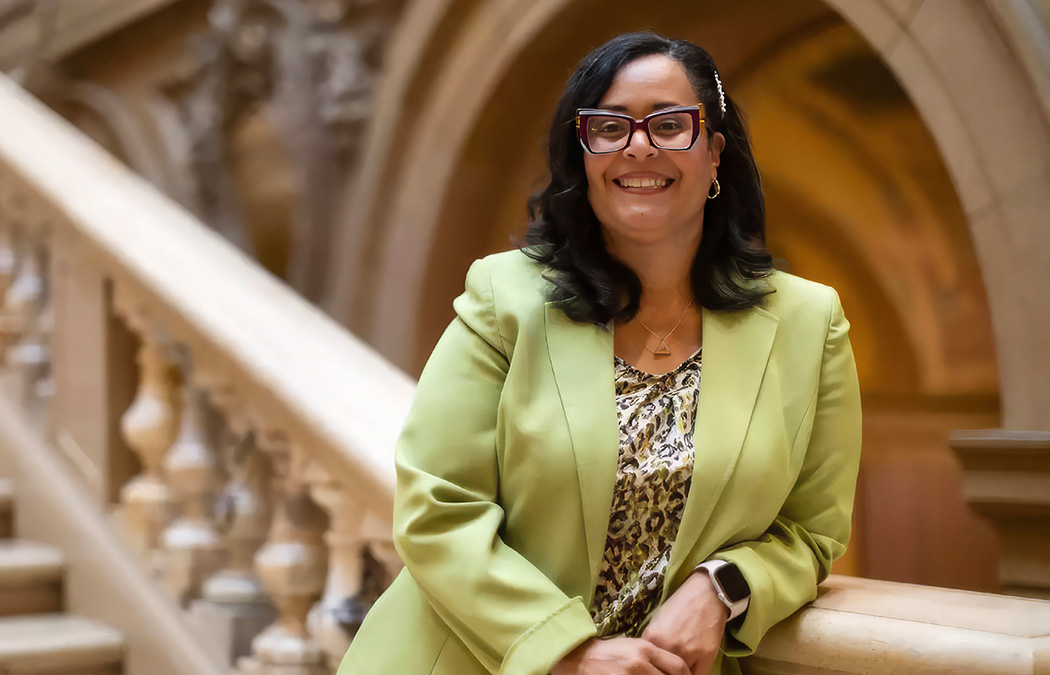Ensuring all Minnesotans have a seat at the table
Dr. Stephanie Burrage C’95 has made it her mission to ensure everyone has both a seat and a voice at the table.
Within a year of her appointment as State of Minnesota’s Chief Equity Officer, Dr. Burrage had traveled to every region but one.
Her primary goal? To listen to those voices.
She says it’s the teacher in her who knows that “all people must be seen, heard, and valued right where they are in life.”
Prior to her current role, she served as deputy commissioner of the Minnesota Department of Education. After earning degrees in education, she was also a teacher in Minneapolis, and later went on to be superintendent of rural, urban, and suburban school districts in Minnesota and Michigan.
Education is where her heart lies. By 16, she knew she wanted to teach, following in the footsteps of her parents, who were both educators. “I wanted to make a difference in students’ lives,” she said.
It was during her teaching career that she first learned about DEI (Diversity, Equity, and Inclusion) before it was even a term. And she saw firsthand areas that needed improvement — in all schools.
“I’m a rural girl. I’m from a rural community and had 35 students in my graduating class, she said. “We assume that what happens in city areas does not happen in rural areas but community needs exist no matter where you live,” she said. “There are needs in all areas, rural, suburban, and big cities. We all must make sure we are meeting the needs of all of our students and community members.”
Dr. Burrage said she often uses an example from her early teaching years in Minneapolis. “I had never taught anyone from Hmong or Laos communities,” she said. “It was back in the ’90s as families were first immigrating to the area. My students taught me as much as I tried to teach them. I would tell them, ‘You’ve got to tell me what things I need to add to better meet your needs so you can see yourself in this curriculum.’ Just because DEI wasn’t a terminology yet, doesn’t mean it wasn’t my job to create that space for them.”
While serving on the Minnesota Department of Education, she led an initiative called “Mind, Body, and Soul,” a monthly virtual meeting of up to 125 community members, with a reach of more than 1,200 Minnesotans, to gather input on how to improve outcomes for people across the state.
“We started with the Black/African American community and are working toward ensuring we meet the needs of the accessibility community and have piloted Latino groups as well,” she said. “The input from the Mind, Body, and Soul convenings have provided insight on how to improve outcomes for community members.
By having Governor Walz, Lt. Governor Flanagan, commissioners, and state leaders in the room with community members, we can get valuable feedback to ensure systems level change on topics that are relevant to communities.
“I believed that bringing about positive change had to start with community, so the voices of community members were heard and honored. These conversations and convenings allowed the Office of Equity, Opportunity, and Accessibility to provide one pathway of many to state government.”
Recurring themes, she said, revolve around available housing, strong education, access to jobs, and healthcare.
“Any day I get to talk with people is a good day,” she said. “I love to hear from people about what they would like to see and their hopes and dreams for their families and how the state serves them.”
Dr. Burrage describes her role as building connections, working with the governor and lieutenant governor, the cabinet, the community, and various state agencies about topics like accessibility, procurement, and grants. Many of the ideas that came out of those community meetings are then prioritized for Gov. Tim Walz’s budget.
Additionally, they host events like the State of Minnesota Career Fair which showcased 635 jobs across the state during Martin Luther King weekend; 1,200 people registered and between 1,500 and 1,600 people attended. “That was a goal that we set,” she said. “How do we make sure we engage with community members in areas of need that they shared with us?”
Another example in spring was the State Procurement Opportunity Fair, in which attendees could meet with buyers from more than 20 state agencies to see how their businesses may fit into procurement and contracting needs.
“Change can happen,” she said. “It’s going to come back to voice. I believe one voice can always help to make change. And, when you get multiple voices aligned, how powerful are we as a world when we can all work together? That doesn’t mean we all share the same opinion. We have to learn how to have respect and honor differing opinions and value one another. We have to ask ourselves, ‘What is the overall good and how do we get past our differences?’ ”
